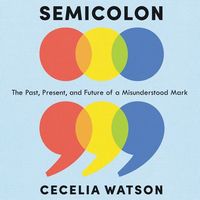 Semicolon:
Semicolon:
The Past, Present, and Future
of a Misunderstood Mark
by Cecelia Watson, Pam Ward (Narrator)
DETAILS: Publisher:HarperAudio Publication Date: July 30, 2019 Format: Unabridged Audiobook Length: 3 hrs., 47 min. Read Date: March 13, 2023

Grammar, in our mythical narrative, is part of the good old days. People used to know grammar properly, we think, the same way they used to walk three miles to school uphill in the snow, and everyone was polite, and better looking and thin, and well dressed.*
* I want to stress that the above represents my guesswork on punctuation, Watson’s is probably superior)
What’s Semicolon About?
I’m going to go the lazy route and just lift from the Publisher’s Website:
A page-turning, existential romp through the life and times of the world’s most polarizing punctuation mark
The semicolon. Stephen King, Hemingway, Vonnegut, and Orwell detest it. Herman Melville, Henry James, and Rebecca Solnit love it. But why? When is it effective? Have we been misusing it? Should we even care?In Semicolon, Cecelia Watson charts the rise and fall of this infamous punctuation mark, which for years was the trendiest one in the world of letters. But in the nineteenth century, as grammar books became all the rage, the rules of how we use language became both stricter and more confusing, with the semicolon a prime victim. Taking us on a breezy journey through a range of examples—from Milton’s manuscripts to Martin Luther King Jr.’s “Letters from Birmingham Jail” to Raymond Chandler’s The Big Sleep—Watson reveals how traditional grammar rules make us less successful at communicating with each other than we’d think. Even the most die-hard grammar fanatics would be better served by tossing the rule books and learning a better way to engage with language.
Through her rollicking biography of the semicolon, Watson writes a guide to grammar that explains why we don’t need guides at all, and refocuses our attention on the deepest, most primary value of language: true communication.
Pam Ward’s Narration
Wow…just wow. Ward throws more emotion, dynamic changes, dramatic changes, and overall oomph! into this narration than several novels I can name. It was so striking, so entertaining, and engaging that most of what I liked and noticed about this book can be attributed to her.
Seriously, immediately before this, I’d listened to a book with multiple murders, other violent crimes, and a natural disaster threatening homes and livelihoods—Ward filled a book about a punctuation mark with more pathos and excitement than that.
At least half the stars down there belong to her.
So, what did I think about Semicolon?
A grammar attack is, quite simply, an ad hominem attack that looks more legitimate becuase it’s dressed up in a cap and gown.
The fact that this ends up being about more than the semicolon is both a strength and a weakness.
It’s a strength because Watson simply doesn’t have enough material to just talk about the semicolon for 200 pages (in the hardcover). The material was so wanting that she really had to spend a lot of time on the case about sales of alcohol in early 20th century Boson than it was worth.
I thought her material on Raymond Chandler and Martin Luther King, Jr. was fantastic. The origins of the semicolon and the ups and downs of its usage pre-grammar textbooks were fascinating.
But when she went off on grammar rules, how they get in the way of communication, can help shut down discourse, etc. The book suffered. Now, she was insightful, helpful, and persuasive on these points (and I say this as someone who reflexively comes down on the “prescriptivist” side in grammar debates). But when she did that, she walked away from “The Past, Present, and Future of a Misunderstood Mark,” and it bugged me. If Watson was going to write something like Emmy J. Favilla’s A World Without “Whom” or Gretchen McCulloch Because Internet, I’d be there in a heartbeat. (also, if she wanted to tackle punctuation beyond the semicolon like Shady Characters by Keith Houston, I’d be all for that) But for this book, she went too far afield for this reader’s taste and lost a lot.
At the end of the day—if you want a rousing celebration and examination of the winking half of an emoticon—or the mark’s more illustrious use and history, this is the book to grab. I almost never recommend a particular format of a book, but you need to listen to at least a sample of Ward’s narration.
This post contains an affiliate link. If you purchase from it, I will get a small commission at no additional cost to you. As always, the opinions expressed are my own.
![]()

